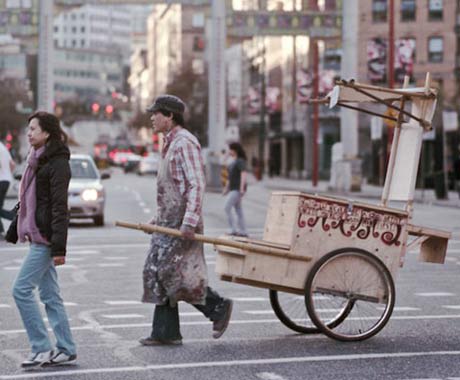Vancouver's international reputation often ignores the fact that its downtown core is actually quite small — which makes it a minor miracle that the city's historic Chinatown has so far managed to avoid being swallowed by Vancouver's condo boom.
Yet, as Everything Will Be shows, Chinatown isn't the thriving cultural hub it once was. The current generation has few ties to their homeland — many can't even speak or read Cantonese — and the neighbourhood's dwindling community, along with the hungry real estate developers willing to pay top dollar to erect more glass towers there, don't bode well for its future.
Through interviews with a handful of the area's residents and business owners, director Julia Kwan explores how these changes are affecting the community. Some are understandably unwilling to let go of the past, while others are ready to move on. Still, there are some, like a young artist who sets up shop for a single year, and controversial real estate consultant Bob Rennie (not a developer, he insists), who believe there's a way for Vancouver's Chinatown to move forward without abandoning its rich and storied history.
Echoing this ongoing struggle, the film's title comes from a giant neon sign that hangs on the side of Rennie's Wing Sang building that says "Everything Will Be Alright," suggesting that Chinatown's fate has yet to be decided.
Kwan's dream-like cinematography beautifully captures Chinatown in its contemporary state of flux while neighbourhood characters fill in its past with their own memories. She never lets her camera roam outside of Chinatown's geographical boundaries, emphasizing the hermetically sealed nature of much of the area.
Yet as much as Chinatown exists in its own unique space in Vancouver, it's also not an island unto itself. Changes in the surrounding neighbourhoods (it backs onto the downtown East side) and historical migration patterns have had as much to do with the sustainability of Chinatown as much as the people already living there. This is a crossroads many cities have already faced, yet oddly Kwan maintains a myopic view, content to make a film about one neighbourhood, for that neighbourhood.
Ultimately the film's strength as much as its weakness, Everything Will Be is a love letter to a neighbourhood Kwan clearly holds near and dear to her heart. And while the film holds outsiders at arm's length, anyone who can sympathize will find much to love.
(NFB)Yet, as Everything Will Be shows, Chinatown isn't the thriving cultural hub it once was. The current generation has few ties to their homeland — many can't even speak or read Cantonese — and the neighbourhood's dwindling community, along with the hungry real estate developers willing to pay top dollar to erect more glass towers there, don't bode well for its future.
Through interviews with a handful of the area's residents and business owners, director Julia Kwan explores how these changes are affecting the community. Some are understandably unwilling to let go of the past, while others are ready to move on. Still, there are some, like a young artist who sets up shop for a single year, and controversial real estate consultant Bob Rennie (not a developer, he insists), who believe there's a way for Vancouver's Chinatown to move forward without abandoning its rich and storied history.
Echoing this ongoing struggle, the film's title comes from a giant neon sign that hangs on the side of Rennie's Wing Sang building that says "Everything Will Be Alright," suggesting that Chinatown's fate has yet to be decided.
Kwan's dream-like cinematography beautifully captures Chinatown in its contemporary state of flux while neighbourhood characters fill in its past with their own memories. She never lets her camera roam outside of Chinatown's geographical boundaries, emphasizing the hermetically sealed nature of much of the area.
Yet as much as Chinatown exists in its own unique space in Vancouver, it's also not an island unto itself. Changes in the surrounding neighbourhoods (it backs onto the downtown East side) and historical migration patterns have had as much to do with the sustainability of Chinatown as much as the people already living there. This is a crossroads many cities have already faced, yet oddly Kwan maintains a myopic view, content to make a film about one neighbourhood, for that neighbourhood.
Ultimately the film's strength as much as its weakness, Everything Will Be is a love letter to a neighbourhood Kwan clearly holds near and dear to her heart. And while the film holds outsiders at arm's length, anyone who can sympathize will find much to love.
